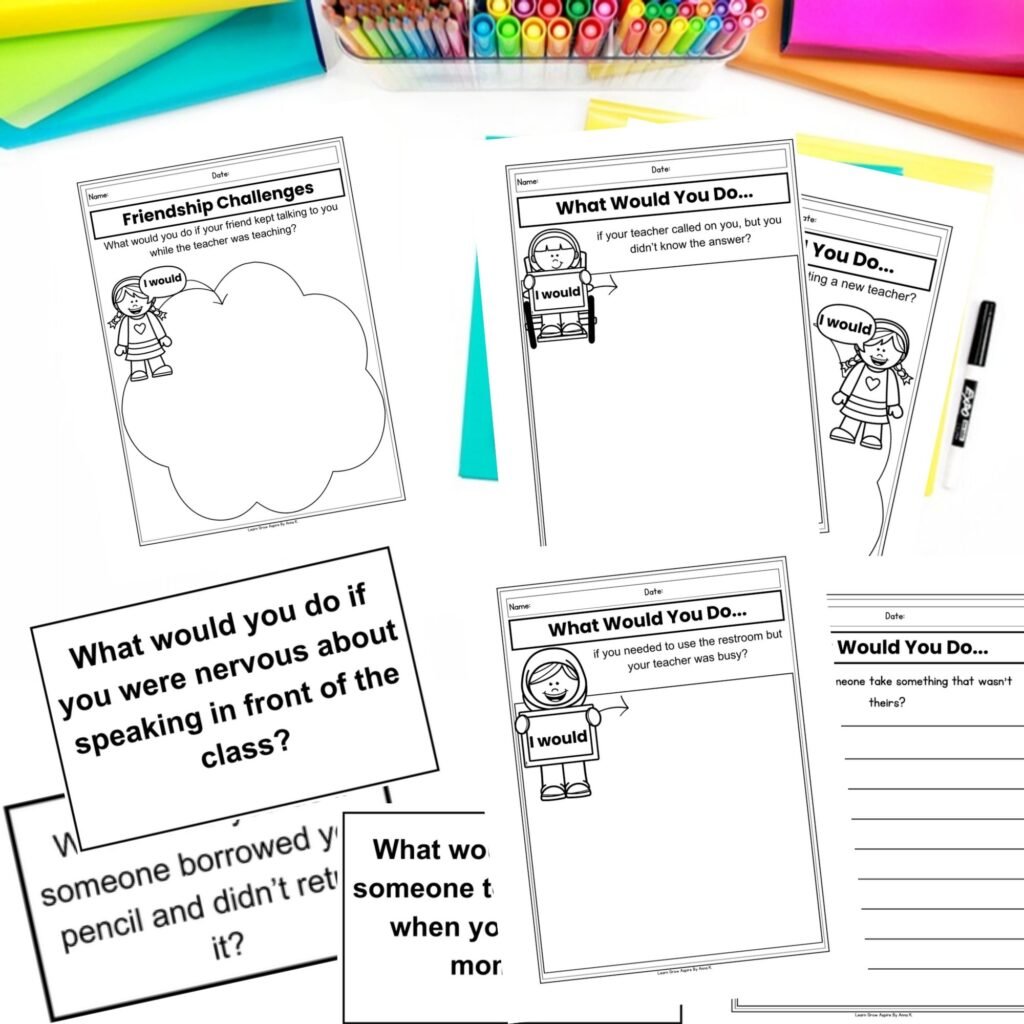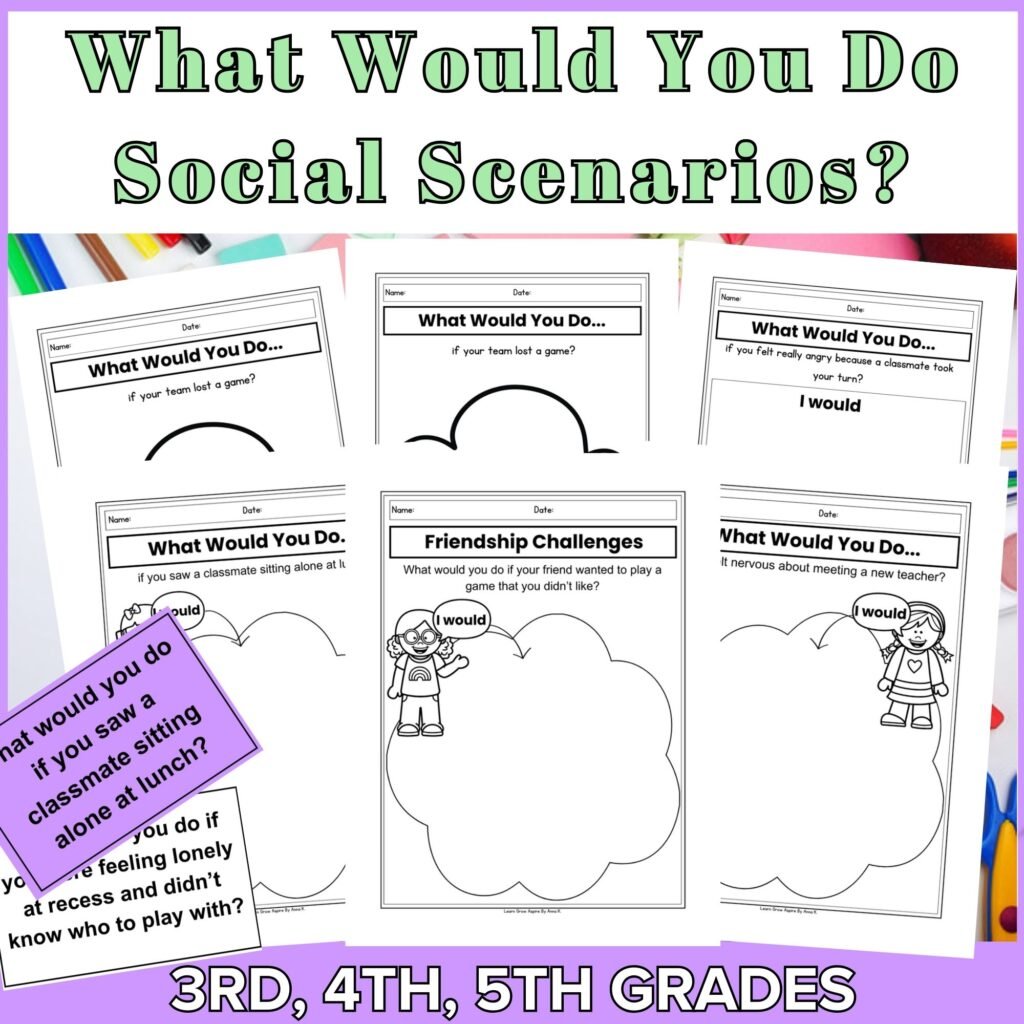Explore these what would you do social scenarios for kids to help them navigate friendships, school interactions, and everyday life with confidence.
Build resilience and emotional intelligence. And discuss expected vs unexpected behaviors.

As a parent, counselor, or teacher, I’m sure you would agree with me that teaching our children how to respond to different social situations isn’t always easy.
What should we tell our kiddos to do if a friend takes their toy without asking?
How should our kids react if they see a classmate sitting alone at lunch?
These real-life situations known as social scenarios provide an opportunity for our kids to think critically, practice problem-solving, and build empathy.
In this blog post, we’ll explore the importance of social scenarios for kids. Practical ways, we as parents, caregivers, and teachers can help them navigate challenging situations.
And lastly, the benefits of using structured activities like worksheets and flashcards.
Understanding Social Scenarios

As mentioned earlier social scenarios are real-life situations that children may encounter in everyday interactions. Whether that’s at school, at home, or in social settings.
These scenarios present challenges that will require your kids to think critically, make decisions, and respond appropriately.
For example, if a child sees a classmate sitting alone at lunch, they must decide how to react to such a situation.
Should they invite the classmate to join them?
Should they ignore the situation?
Or perhaps ask a teacher or parent for guidance?
Teaching our kids how to handle these social scenarios will help them develop strong social and emotional skills.
Including empathy, communication, problem-solving, and conflict resolution.
Social scenarios are essential for helping our children navigate friendships, classroom behavior, and teamwork.
How to Help Kids in Social Scenarios?

Helping our kids learn how to handle social scenarios involves a combination of discussion, role-playing, and practice.
Here are a few strategies that you can consider using to guide them:
Encourage Open Conversations – Create a safe space where your kids or students can talk about social situations they have faced or may encounter. Ask open-ended questions such as, “What would you do if a friend took your toy without asking?”
Use Role-Playing Activities – Act out different scenarios with kids so they can practice appropriate responses in a fun and engaging way. Such as, “If you forgot to bring your lunch to school, what would you do?”
Discuss Feelings and Perspectives – Teach children to consider how others might feel in a given situation. Ask questions like, “How do you think your classmate feels when they sit alone at lunch?”
Model Positive Social Behavior – Demonstrate appropriate reactions and problem-solving techniques in daily interactions. Kids learn by observing adults and older peers.
Provide Clear Strategies – Teach your kids practical ways to respond to social challenges. By using “I” statements, asking for help when needed, or taking deep breaths before reacting emotionally.
Practice with Scenarios Worksheets and Flashcards – Using structured activities like worksheets and flashcards can help reinforce learning and make practicing social skills more interactive.
Why Do Social Scenarios Activities Help Kids?
Social scenario activities give kids a structured way to practice navigating everyday social interactions.
Such as:
Build Confidence – By practicing responses before they ever face real-life situations.
Enhance Problem-solving Skills – By helping kids think through their choices and possible consequences.
Promote Empathy and Kindness – By encouraging children to consider others’ feelings and perspectives.
Improve Communication Skills – Through teaching kids how to express themselves appropriately in different social contexts.
Support emotional Regulation – By helping children learn how to stay calm and react appropriately in challenging situations.
By engaging with social scenarios, our children can and will develop critical life skills that will help them form positive relationships and navigate social challenges effectively.
Benefits of Using Social Scenarios Worksheets and Flashcards

Our resource includes 40 what would you do social scenarios to discuss expected vs unexpected behaviors with your kids.
Featuring real-life situations such as:
- What would you do, If you saw a classmate sitting alone at lunch?
- If a classmate borrowed your marker and didn’t give it back, what would you do?
- What would you do, if you didn’t understand the directions for an assignment?
- If someone borrowed your pencil and didn’t return it, what would you do?
I bet these situations sound like ones your students or kids will face in the classroom.
Using these printable worksheets and flashcards as tools for practicing social scenarios provides several benefits.
Such as:
Engagement Through Interactive Learning – Your kids or students will actively participate in discussions, making learning more meaningful and enjoyable.
Reinforcement of Key Social Skills – Repetition and practice will help your students or children internalize appropriate responses to social situations.
Self-Paced Learning – Kids can work through scenarios at their own pace, giving them time to reflect on the best response. You can use these as homework exercises, independent work, reflection, character-building activities, etc.
Encouragement of Group Discussions – As a classroom teacher you can engage your students in group discussions, allowing your students to hear different perspectives and solutions.
Development of Critical Thinking Skills – These social scenario worksheets require children to analyze the situation and think critically about their responses.
Other Social Skills Activities for Kids
In addition to using social scenarios, there are many other fun and effective ways to help your kids or students develop social skills:
Storytelling and Books – Read books that explore social skills, emotions, and problem-solving. Discuss characters’ choices and alternative outcomes.
Board Games and Group Activities – Games that involve turn-taking, cooperation, and strategy help reinforce social interaction skills.
Emotion Charades – Have kids act out different emotions and guess what feeling is being expressed. This activity helps build emotional awareness and empathy.
Buddy System – Pair your kids up with other classmates to encourage positive interactions and teamwork.
Kindness Challenges – Create daily or weekly challenges encouraging acts of kindness, such as writing a thank-you note or sharing with a friend.
Conflict Resolution Role-Play – Practice different ways to resolve conflicts peacefully and respectfully.
Classroom or Family Meetings – Hold regular meetings where kids can discuss social challenges and brainstorm solutions together.
What Would You Do Social Scenarios For Kids

Helping your kiddos navigate social scenarios is essential for their emotional and social development!
Through engaging activities like worksheets, flashcards, role-playing, and group discussions, your children can practice and refine their social skills in a supportive environment.
Our what would you do in social scenarios to discuss expected vs unexpected behavior resource provides 40 practical and relatable situations.
Encouraging your kiddos to think critically. Build confidence, and develop strong interpersonal skills.
By incorporating these activities into your home or classroom. You can help your children learn how to handle social challenges with kindness, empathy, and confidence.
Related Blog Posts
- Anger management worksheets for kids
- Activities to foster a growth mindset in kids
- What to do when your kids are having big emotions
Pin These Expected Vs Unexpected Behaviors Worksheets
Head to your Pinterest account and save these what would you do social scenarios to discuss expected vs unexpected behaviors with your kiddos.

Some of the links in this post may be affiliate links. I’m also an Amazon Affiliate and will occasionally link to some of my favorite Amazon products. I will receive a small percentage back if you purchase through my link. You won’t be charged a penny more if you shop through my links. That said, I do NOT recommend anything I do not use and love! Thank you for helping support my blog!
